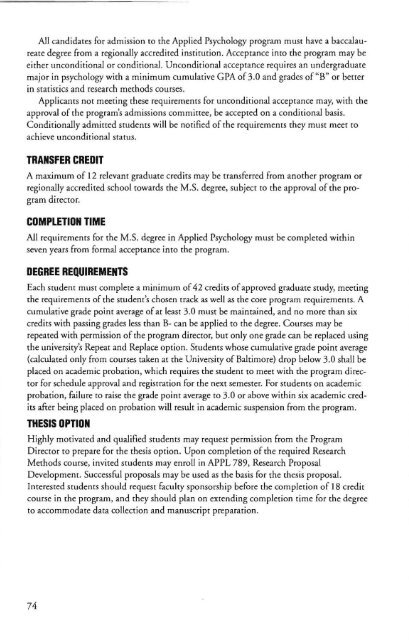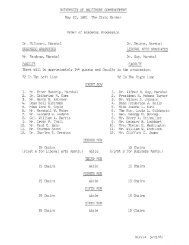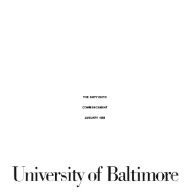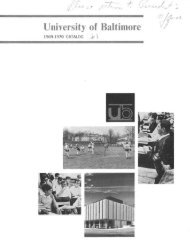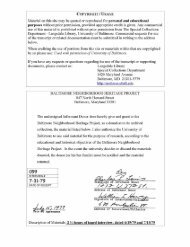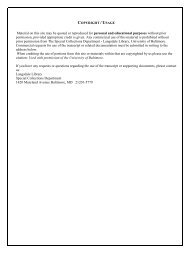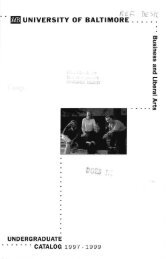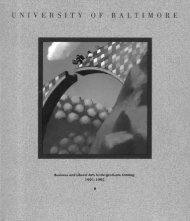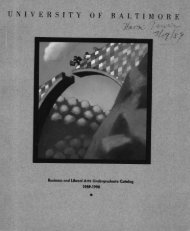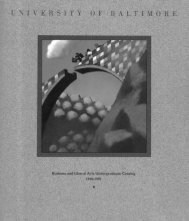2003-2005 - Special Collections - University of Baltimore
2003-2005 - Special Collections - University of Baltimore
2003-2005 - Special Collections - University of Baltimore
You also want an ePaper? Increase the reach of your titles
YUMPU automatically turns print PDFs into web optimized ePapers that Google loves.
All candidates for admission to the Applied Psychology program must have a baccalaureate<br />
degree from a regionally accredited institution. Acceptance into the program may be<br />
either unconditional or conditional. Unconditional acceptance requires an undergraduate<br />
major in psychology with a minimum cumulative GPA <strong>of</strong> 3.0 and grades <strong>of</strong> "B" or better<br />
in statistics and research methods courses.<br />
Applicants not meeting these requirements for unconditional acceptance may, with the<br />
approval <strong>of</strong> the program's admissions committee, be accepted on a conditional basis.<br />
Conditionally admitted students will be notified <strong>of</strong> the requirements they must meet to<br />
achieve unconditional status.<br />
TRANSFER CREDIT<br />
A maximum <strong>of</strong> 12 relevant graduate credits may be transferred from another program or<br />
regionally accredited school towards the M.S. degree, subject to the approval <strong>of</strong> the program<br />
director.<br />
COMPLETION TIME<br />
All requirements for the M.S. degree in Applied Psychology must be completed within<br />
seven years from formal acceptance into the program.<br />
DEGREE REQUIREMENTS<br />
Each student must complete a minimum <strong>of</strong> 42 credits <strong>of</strong>approved graduate study, meeting<br />
the requirements <strong>of</strong> the student's chosen track as well as the core program requirements. A<br />
cumulative grade point average <strong>of</strong> at least 3.0 must be maintained, and no more than six<br />
credits with passing grades less than B- can be applied to the degree. Courses may be<br />
repeated with permission <strong>of</strong> the program director, but only one grade can be replaced using<br />
the university's Repeat and Replace option. Students whose cumulative grade point average<br />
(calculated only from courses taken at the <strong>University</strong> <strong>of</strong> <strong>Baltimore</strong>) drop below 3.0 shall be<br />
placed on academic probation, which requires the student to meet with the program director<br />
for schedule approval and registration for the next semester. For students on academic<br />
probation, failure to raise the grade point average to 3.0 or above within six academic credits<br />
after being placed on probation will result in academic suspension from the program.<br />
THESIS OPTION<br />
Highly motivated and qualified students may request permission from the Program<br />
Director to prepare for the thesis option. Upon completion <strong>of</strong> the required Research<br />
Methods course, invited students may enroll in APPL 789, Research Proposal<br />
Development. Successful proposals may be used as the basis for the thesis proposal.<br />
Interested students should request faculty sponsorship before the completion <strong>of</strong> 18 credit<br />
course in the program, and they should plan on extending completion time for the degree<br />
to accommodate data collection and manuscript preparation.<br />
74


